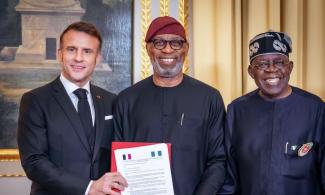In a landmark move to enhance the critical minerals value chain, Nigeria and France have signed a Memorandum of Understanding (MOU) focused on sustainability, innovation, and economic growth in the mining sector. The agreement, finalized during President Bola Ahmed Tinubu’s official visit to France, reflects a deepened commitment to environmentally responsible mining practices and equitable resource management.
The MOU was signed by Nigeria’s Minister of Solid Minerals Development, Dele Alake, and France’s Inter-Ministerial Delegate for Critical Ores and Metals, Benjamin Gallezot. This collaboration seeks to diversify the global supply of critical minerals—such as lithium, cobalt, and rare earth elements—essential for clean energy technologies.
From an environmental perspective, the partnership prioritizes sustainability, with plans to reduce mining’s carbon emissions and water usage while mitigating climate impacts. A significant component of the agreement focuses on rehabilitating over 2,000 abandoned mining pits across Nigeria, addressing decades of environmental degradation and promoting local community development.
The MOU also emphasizes education and capacity building, including Franco-Nigerian student exchanges and specialized training programs. These initiatives aim to equip both nations with the technical expertise required to manage the growing complexities of the critical minerals sector.
Economically, the partnership establishes co-financed executive and processing projects to attract investments and position Nigeria as a global player in the critical minerals supply chain. This move could pave the way for enhanced trade ties between the two countries, ensuring long-term benefits for both economies.
For France, the partnership aligns with its vision of securing critical resources for sustainable energy projects. For Nigeria, it represents a strategic effort to boost its solid minerals sector, moving beyond oil dependency and fostering industrial growth.
The agreement further commits both nations to adopting international best practices, particularly in transparency and community engagement, ensuring that mining activities prioritize the well-being of affected populations.
As global demand for critical minerals intensifies, the France-Nigeria partnership serves as a model for equitable and sustainable international collaboration in resource management. This agreement not only addresses present-day energy needs but also lays a foundation for a greener, more inclusive future.



